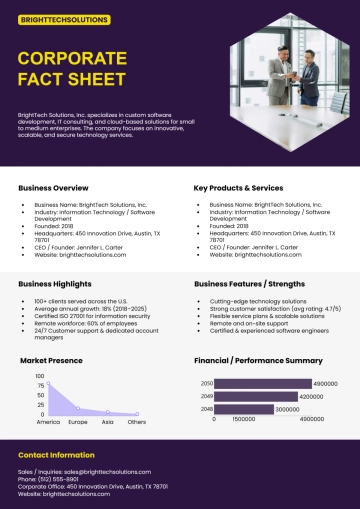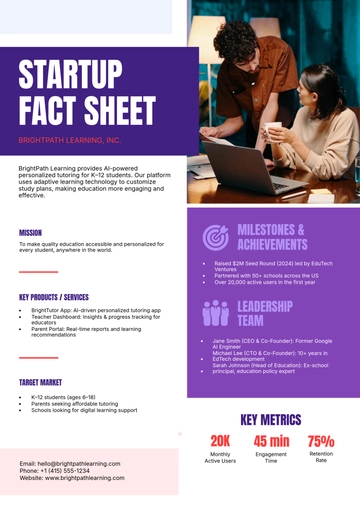Free Business Management Fact Sheet

I. Introduction

The Business Management Fact Sheet, offered by [Your Company Name], is meticulously crafted to serve as an extensive repository of knowledge encompassing a wide array of fundamental principles and contemporary practices in the realm of business management.
II. Overview
A. Definition:
Business management encompasses the planning, organizing, directing, and controlling of organizational activities to achieve specified goals and objectives. It involves various functions, including strategic planning, operations management, human resource management, finance, marketing, and more.
B. Importance:
Effective business management is crucial for the success and sustainability of any organization. It ensures efficient utilization of resources, alignment of activities with strategic objectives, adaptation to market dynamics, and maximization of profitability.
C. Key Points:
Strategic Planning: Developing long-term goals and strategies to guide organizational direction and decision-making.
Operational Efficiency: Streamlining processes, optimizing workflows, and enhancing productivity to achieve operational excellence.
Leadership: Inspiring and motivating employees, fostering teamwork, and creating a positive organizational culture.
Financial Management: Managing finances, budgeting, financial analysis, and risk management to ensure financial stability and growth.
Marketing and Sales: Identifying target markets, developing marketing strategies, and driving sales to generate revenue and sustain competitive advantage.
III. Core Principles
Explore the fundamental principles of business management:
Principle | Description |
|---|---|
Planning | Setting goals, formulating strategies, and developing action plans to achieve organizational objectives. |
Organizing | Structuring roles, responsibilities, and resources to facilitate efficient operations and coordination. |
Leading | Providing direction, inspiration, and support to employees to achieve common goals and objectives. |
Controlling | Monitoring performance, measuring outcomes, and implementing corrective actions to ensure alignment with plans and goals. |
IV. Benefits of Effective Business Management
Discover the benefits of implementing sound business management practices:
Improved Efficiency: Streamlined processes and optimized workflows result in increased productivity and reduced waste.
Enhanced Decision-Making: Access to timely and accurate information enables informed decision-making at all levels of the organization.
Better Resource Utilization: Effective allocation of resources leads to cost savings and improved resource utilization.
Increased Competitive Advantage: Strong leadership, strategic planning, and operational excellence contribute to a sustainable competitive advantage.
Enhanced Stakeholder Satisfaction: Meeting stakeholder expectations through effective management builds trust and credibility.
V. Success Stories
Explore success stories of organizations that have implemented effective business management practices:
Case Study 1: [Summary of how a company improved its profitability through strategic planning and operational efficiency.]
Case Study 2: [Summary of how a business achieved market leadership by implementing innovative marketing and sales strategies.]
Case Study 3: [Summary of how a company transformed its organizational culture and achieved employee satisfaction and retention.]
VI. Frequently Asked Questions
What are the key components of strategic planning?
How can business management principles be applied to different industries?
What role does technology play in modern business management practices?
VII. Conclusion
In conclusion, effective business management is essential for achieving organizational success and sustainability in today's competitive business environment. By understanding the core principles, implementing sound practices, and continuously adapting to changes, businesses can thrive and achieve their goals.
- 100% Customizable, free editor
- Access 1 Million+ Templates, photo’s & graphics
- Download or share as a template
- Click and replace photos, graphics, text, backgrounds
- Resize, crop, AI write & more
- Access advanced editor
Optimize your business management strategies with our dynamic Fact Sheet Template, sourced from Template.net. Designed for maximum efficiency, it's fully editable and customizable to meet your specific requirements. Seamlessly integrate data using our AI tool, streamlining decision-making processes. From performance reviews to investor briefs, this template enhances your business management endeavors with precision and professionalism.





























